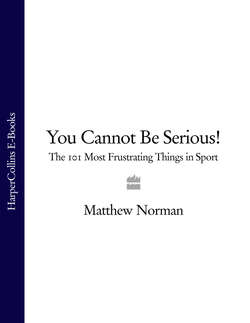Читать книгу You Cannot Be Serious!: The 101 Most Frustrating Things in Sport - Matthew Norman - Страница 24
Оглавление83
Harold ‘Dickie’ Bird
In the absence of an ‘uncle’ or schoolmaster showing undue interest in his development, the cricket-fixated boy of the 1970s knew no more unwanted an authority figure than the then doyen of Test match umpires.
It would be an exaggeration to claim that Dickie ruined my childhood and early adolescence, but his heightened fears about the weather condemned me to countless summer days of needless boredom. If he had an inkling in his bones that a raincloud drizzling over central Turkmenistan was contemplating a move in a westerly direction that might take it over Headingley by mid-November, he’d take them off. If the light dipped by one iota below the level required to read the bottom line of the optician’s wall chart from forty paces, off he would take them.
Sweet-hearted as this eternal schoolboy seemed to be (even at seventy-seven years old you imagine him curling up under the bedclothes with his torch and a copy of Wisden), a searing pain in the bum he undeniably was. His morbid terror of making mistakes led to him routinely rejecting LBW shouts which Hawkeye today would show travelling like guided missiles towards the middle of middle stump. The surest method of avoiding mistakes, of course, was to avoid the playing of any cricket, which may explain why reports of a small shadow at deep fine leg at Sabina Park or the ’Gabba would have him taking them off at Edgbaston.
In retirement, alas, the endearing fussbucket nerviness of old mutated into something less lovable. Dickie Bird the umpire became Dickie Bird the National Character, and this dubious role he embraced without a shred of the neurosis he had lavished on unconfirmed reports of cloud movement in Chad. The success of his autobiography, imaginitively entitled My Autobiography, went to his head. The sweetness was replaced by a mild strain of egomania that persuaded him to keep raiding the same tiny storeroom of tales for the joy of a listening public that had perhaps been sated by hearing them the first time.
The Peter Ustinov of the bails appeared to have precisely three hilarious stories from his decades behind the stumps, which he recycled with identical stresses, timing and breathless delight in their drollness. There was the one, from his late career, when Alan Lamb (‘Lamby’) handed him a mobile phone to look after while he stood at square leg, and he was then side-splittingly rung mid-over by Ian Botham (‘Beefy’). There was the one about turning up at the Palace to collect his MBE fourteen hours before the ceremony. And there was the one about being invited for lunch at Geoffrey Boycott’s house, no one answering when he rang the bell by the gate, having to climb a wall to gain admittance, and then being palmed off with cheese on toast.
Perhaps there were others the mind has blanked out, much as it supposedly does the pain of childbirth. But it is Dickie Bird’s most remarkable achievement that in his anecdotage he came to make you wistful for the days when he used his mouth for no other purpose than to mutter ‘Not out’ as a ball that pitched on middle stayed on middle, and to engage his fellow umpire in urgent consultations about the threat posed to the continuation of play by a sandstorm in the northern Sahara.
